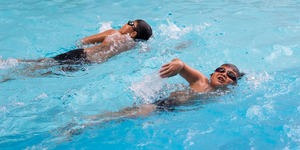Understanding the Role of Sports in Kids’ Lives
Sports play a crucial role in children’s development, promoting physical fitness, discipline, teamwork, and confidence. However, as youth sports become increasingly competitive, children can end up training excessively, which can lead to both physical and mental health issues. Recognizing when sports are “too much” is essential for parents, coaches, and caregivers to help ensure kids enjoy the benefits of athletics without compromising their well-being.
Why Are Kids’ Sports Becoming More Intense?
Youth sports have evolved from casual recreation to highly competitive activities, often with long hours, intense practices, and rigorous competitions. Many children are encouraged to specialize in a single sport at an early age, with year-round training and high expectations for performance. Social pressures, aspirations of college scholarships, and even parental involvement in kids’ sports careers contribute to an environment where kids may feel they need to push themselves beyond healthy limits.
Which Age Group is Most Affected by Sports Overload?
Children ages 10 to 18 are especially vulnerable to the effects of excessive sports involvement. At these ages, kids are still developing physically and emotionally, and they are more prone to injuries from repetitive strain. Adolescents, in particular, may feel pressured to meet high-performance standards, leading to an increased risk of burnout, injuries, and emotional stress.
Health Risks of Excessive Sports in Kids
While sports offer numerous benefits, excessive training or pressure can lead to a variety of health risks, including:
1. Overuse Injuries: Repeated, high-intensity activity without proper rest can cause overuse injuries like stress fractures, tendinitis, and joint damage. Common injuries include “Little League shoulder,” “Osgood-Schlatter disease,” and “jumper’s knee,” which are directly related to repetitive motions in sports like baseball, basketball, and soccer.
2. Burnout and Mental Fatigue: Intense training schedules and high expectations can lead to burnout, a state of mental and emotional exhaustion. Burnout can manifest as a loss of interest in the sport, lack of motivation, irritability, and decreased performance. Kids experiencing burnout may struggle with anxiety, depression, and low self-esteem.
3. Growth Plate Injuries: In children, growth plates (areas of developing cartilage) are particularly vulnerable to injury. High-impact activities, repetitive strain, and early specialization in a sport can increase the risk of growth plate injuries, which can affect normal bone development and lead to lifelong issues if not managed properly.
4. Dehydration and Nutritional Deficits: Intensive sports training increases the demand for proper hydration and balanced nutrition. Children who are training excessively may not consume enough nutrients or fluids to support their activity levels, which can lead to dehydration, fatigue, and even eating disorders if they try to meet unrealistic body standards.
5. Psychological Pressure: The pressure to perform well can affect children’s mental health. Fear of failure, pressure from parents or coaches, and the constant pursuit of perfection can lead to stress, anxiety, and even a negative self-image. Over time, this can impact academic performance and relationships outside of sports.
Which Countries Are Facing the Most Pressure in Youth Sports?
Countries like the United States, Canada, and Australia report high levels of youth sports participation, often with an intense focus on competitive performance. In these countries, youth sports leagues, travel teams, and specialized training facilities are prevalent, leading to higher expectations and pressures. Some European countries, such as the United Kingdom, also have robust youth sports systems, but cultural differences may influence the degree of pressure felt by young athletes.
Do’s and Don’ts for Healthy Sports Involvement in Kids
Do’s:
• Encourage Rest and Recovery: Ensure children have at least one to two days off per week from their main sport and emphasize the importance of rest periods to prevent injuries.
• Promote Variety in Physical Activities: Encourage children to engage in multiple sports or physical activities instead of specializing too early, as this can improve physical skills and reduce the risk of overuse injuries.
• Listen to Kids’ Feelings: Create a safe environment where kids feel comfortable expressing if they feel stressed, tired, or overwhelmed by sports.
• Emphasize Fun and Enjoyment: Remind children that sports should be fun and enjoyable, focusing on learning, growth, and friendship over winning or achieving high scores.
Don’ts:
• Avoid Excessive Pressure: Refrain from putting too much emphasis on winning or scoring high points. Instead, value effort, teamwork, and skill development.
• Do Not Ignore Signs of Fatigue: Take complaints of soreness, lack of motivation, or tiredness seriously, as these can be early signs of burnout or overuse injuries.
• Limit Specialization in a Single Sport at a Young Age: Specializing in one sport too early can lead to repetitive strain injuries and limit overall physical development.
• Don’t Over-Schedule Sports Commitments: Ensure children have ample time for other interests, academic responsibilities, and unstructured play.
Precautions to Prevent Sports Overload in Kids
If your child is highly active in sports, consider these precautions to help prevent burnout and injuries:
1. Set Realistic Expectations: Talk with coaches and your child to set reasonable, age-appropriate goals that prioritize health over achievements.
2. Prioritize Rest Days: Schedule at least one day per week with no sports practice or training, allowing the body and mind to recover.
3. Encourage Cross-Training: Introduce complementary activities like swimming, cycling, or yoga, which help build strength and flexibility without the repetitive strain of a single sport.
4. Regular Checkups: Schedule routine checkups with a pediatrician, especially if your child experiences persistent soreness, fatigue, or other health concerns.
5. Educate on Hydration and Nutrition: Make sure your child understands the importance of staying hydrated and eating a balanced diet to support their energy needs during sports.
Conclusion
While sports play an essential role in child development, too much intensity or pressure can lead to physical and emotional health issues. Finding the right balance is key: children should be able to enjoy sports, learn valuable skills, and build confidence without risking burnout or injury. By recognizing the signs of sports overload and fostering a balanced approach to athletics, parents and coaches can help kids enjoy a healthy and positive sports experience that benefits their overall well-being.








